NonWoven Recycling TiO2 BioPET 21-10-2021 - Arhive
NonWoven Recycling TiO2 BioPET
Crude Oil Prices Trend
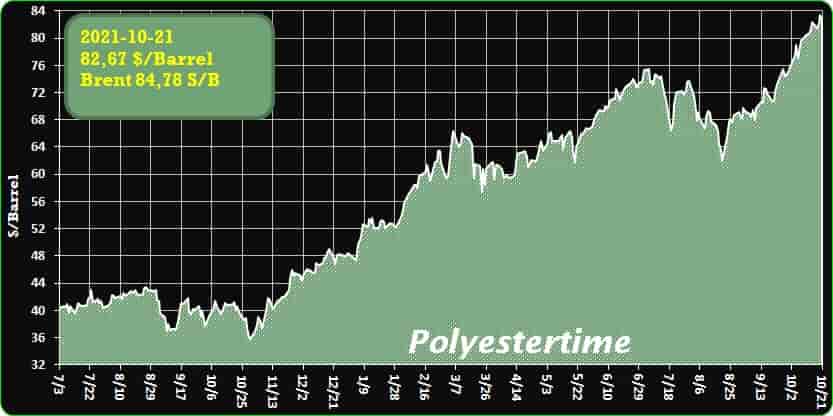
-New Teijin Frontier Thai site to produce recycled polyester chips
The Thai subsidiary of Teijin Frontier Co, Ltd is to launch a new facility to convert used domestically-produced plastic bottles into recycled polyester chips for the production of high-quality polyester filament.
Teijin Frontier, the Teijin Group’s fibers and products converting company, announced today (19 October) that its core base for polyester fibre manufacturing, Teijin Polyester (Thailand) Limited (TPL), plan to start operations at the new site in January 2022. It expects the facility to produce 7,000 tonnes of recycled polyester chips annually by fiscal 2025.
Teijin Frontier says it will install cleaning equipment and the latest repelletising machine for removing foreign substances from recycled PET bottles before they are molded into chips. TPL will use Teijin Frontier’s proprietary quality-control technologies in its system for turning Thai plastic bottles into recycled polyester chips for the production of polyester filament. The raw yarn produced at TPL will be used in Teijin Frontier’s Ecopet recycled filament yarn.
Products made with recycled materials have been growing in recent years due to increasing environmental awareness. In addition, Teijin Frontier notes the demand for recycled polyester filaments as well as staple polyester fibres has increased significantly. To date, Teijin Frontier has been procuring recycled raw materials to meet these growing demands. In the interim, the company has been seeking recycled-polyester raw material suppliers that could help the company both to eliminate high-impact long-distance transportation and to optimise its resource-cycling operations. Despite its best efforts, however, the company eventually determined that it would not be possible to secure stable, high-quality bottle flakes in the vicinity of Thailand, where Teijin Frontier’s main plants are located.
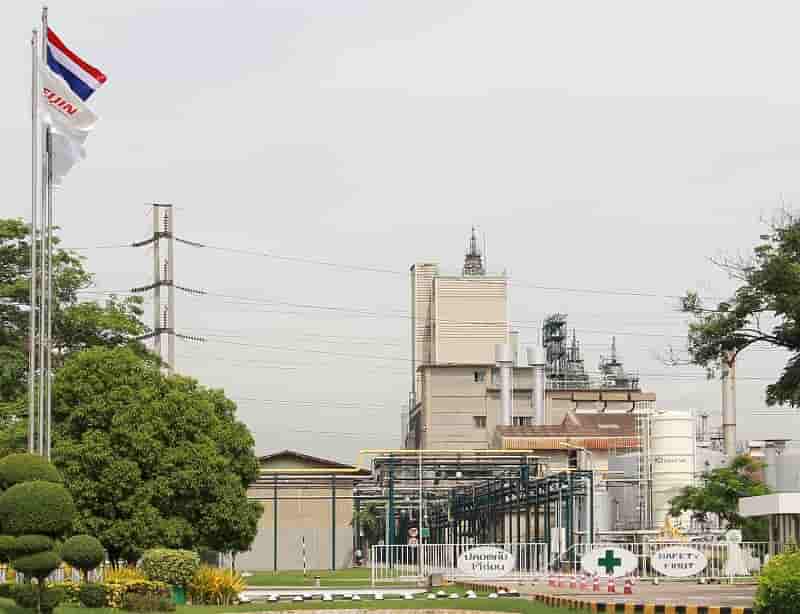
Applied DNA Sciences, Inc. (NASDAQ: APDN) (Applied DNA or the “Company”), a leader in Polymerase Chain Reaction (PCR)-based DNA manufacturing and nucleic acid-based technologies, today announced signing a mutual collaboration agreement (the “Agreement”) with Ganesha Ecosphere Ltd. (BSE: GANECOS) (Ganesha), the largest recycled polyester (rPET) fiber producer in India with over 300-plus customers, 250-plus suppliers, and 500-plus product variants. Under the terms of the Agreement, Ganesha will deploy the CertainT® platform, Applied DNA’s traceability system, to tag an initial pilot production of recycled polyester (rPET) at Ganesha’s facilities in India and conduct confirmatory samples testing at Applied DNA’s laboratories in India and the U.S. The collaboration between the two companies will provide brands and textile manufacturers with a trusted solution to support their sustainability goals for rPET and confirm raw material authenticity at all stages of the textile value chain.
The Agreement enables Ganesha to introduce and apply CertainT-verified rPET to provide assurance for the raw material with textile and apparel customers. Ganesha will also employ Applied DNA’s recently introduced SigNature® T-100 tracer system that enables rPET source material to be quantified in polyester blends by the CertainT platform. SigNature T-100 is a proprietary molecular-based tracer system used to identify, analyze, and verify rPET, polypropylene, acrylic, and potentially other man-made materials for claims of both identification and quantification of the raw material tagged and subsequently spun into yarn for various textile products.
“Traceability has now added more authenticity and credibility to the entire textile supply chain and is becoming an integral part of the recycling process. With Applied DNA and CertainT, our customers can now trust in the original tagged synthetic fiber and verify product-related sustainability claims,” stated Mr. B.P. Sultania, Joint President of Ganesha Ecosphere Ltd. NonWoven Recycling TiO2 BioPET
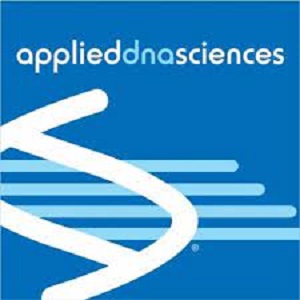
-Coca-Cola To Commercialise ‘Next-Generation’ Biomaterials
Coca-Cola has announced the first planned commercialisation of technologies to convert second-generation biomass to plant-based monoethylene glycol (bMEG) in association with Changchun Meihe Science & Technology and UPM.
Monoethylene glycol (MEG) is one of the major components in polyethylene terephthalate (PET), which is used for plastic beverage bottles.
The new technology marks the most significant advancement in the commercial viability of bioplastics since Coca-Cola introduced the first-generation technology in its PlantBottle packaging in 2009.
The move will commercialising a process that is not only more efficient than current bMEG technologies but is based on feedstock that cannot be used as source of food.
Nancy Quan, chief technical and innovation officer at The Coca-Cola Company, said, “The viability of this next-generation biomaterial is a significant technological breakthrough in our ongoing efforts to reduce our use of virgin oil-based plastics, by increasing our use of recycled and renewable alternatives. NonWoven Recycling TiO2 BioPET
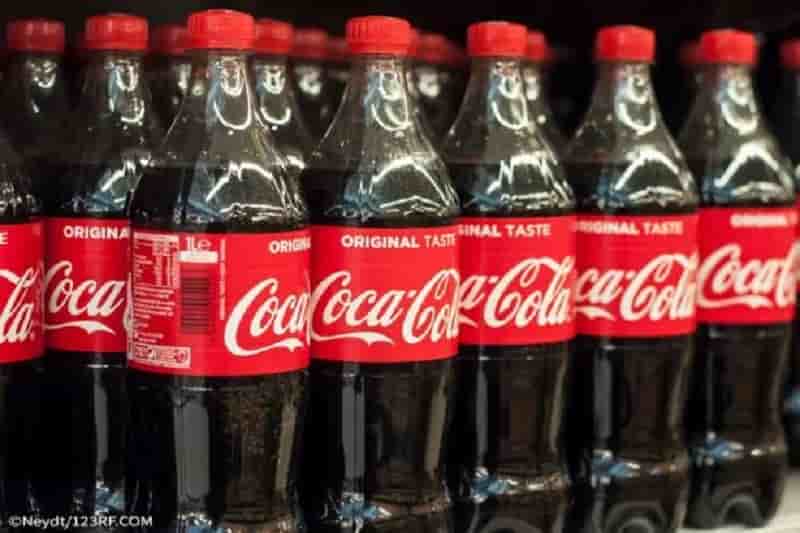
-Starlinger closing the loop in food-grade applications
Starlinger & Co. GmbH is adapting technology that will provide a simpler, lower-cost approach to completely closing the loop when recycling polyolefins for food-grade applications.NonWoven Recycling TiO2 BioPET
Along with allowing for up to 100 percent recycled content in packaging, the new method also will cut the cost of processing, said Armin Villa, regional sales manager for Starlinger, while on the Fakuma trade show floor in Friedrichshafen.
Starlinger has just received letters of no objection from the U.S. Food and Drug Administration to utilize its recycled pellet reconditioning system created earlier with odor reduction in mind to help boost polyolefin recycling capabilities for food-grade applications.
Adaptations of the system now allow customers to close the loop and use 100 percent recycled content for high density polyethylene milk bottles and HDPE caps through the FDA letters of nonobjection. Previous approaches limited recycled content to 50 percent.
A key to the new approach is that recyclers need to know where the HDPE has been and how the material has been used.
“It only works on materials where you can ensure the traceability is given of the materials,” Villa said. NonWoven Recycling TiO2 BioPET
The reconditioning system was developed in recent years to remove suborn odors from recycled HDPE bottles holding products like detergents and shampoos.
“All materials where there still might be a smell in it,” Villa said. The changes now allow for food-grade resin recycling at 100 percent.
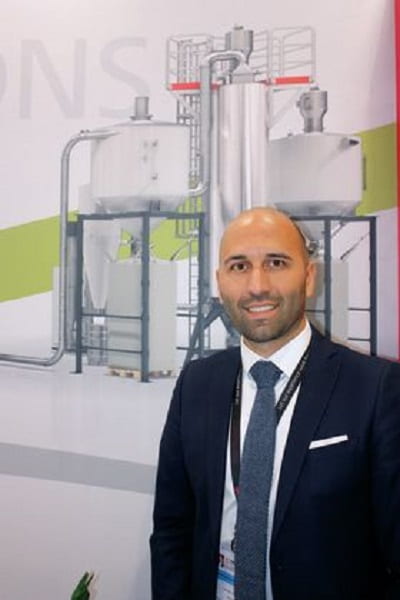
-Electronic fibre spun into clothing to teach breathing techniques
A new fibre has been developed that can be made into clothing that tracks stretching and compression, then provides immediate tactile feedback in the form of pressure, lateral stretch, or vibration.
Developed by researchers in the US and Sweden, the fabrics could be used in garments that help train singers or athletes to better control their breathing, or those that help patients recovering from disease or surgery to recover their breathing patterns.
The multi-layered “OmniFibers” contain a fluid channel in the centre, which can be activated by a fluidic system. This system controls their geometry by pressurising and releasing a fluid medium, such as compressed air or water, into the channel, allowing the fibre to act as an artificial muscle. NonWoven Recycling TiO2 BioPET
They also contain stretchable sensors that can detect and measure the degree of stretching. The resulting composite fibres are thin and flexible enough to be sewn, woven, or knitted using standard commercial machines, the researchers said.

-ROHA launches NIVEOUS, a white food color alternative to Titanium Dioxide
ROHA adds the NIVEOUS range to its product portfolio –safe, natural & clean label white food color alternatives to Titanium Dioxide. NIVEOUS colors are innovative color solutions for panned candies, gummies and jellies, and beverages. Made from combinations of starches and/or calcium carbonate, they maintain whiteness and are a natural white opacifiers. NIVEOUS pigments are insoluble with a high reflective index, have exceptional stability to heat and light, create whitening effect in low dosages and offer incredible brightness levels. With no compromise to visual appearance and texture, they promise a safe and a sustainable white option, while reducing workplace safety concerns. This makes them the ideal replacer to TiO2 in confectionery and beverages.
NIVEOUS Product Portfolio
NIVEOUS is free of all the problems of TiO2. So if you are a food manufacturer impacted by the latest EFSA ruling on the use of TiO2 as a food additive, you now have the alternative you need. NonWoven Recycling TiO2 BioPET
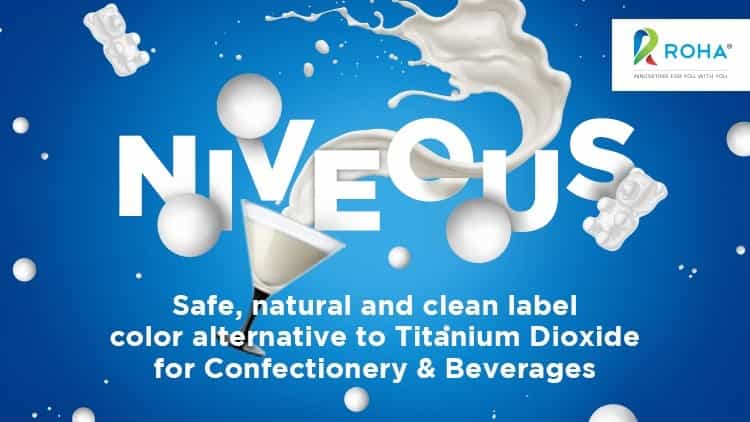
-Europe leading region of innovation in plastic recycling and alternative plastics
Thank you for sharing this story! However, please do so in a way that respects the copyright of this text. If you want to share or reproduce this full text, please ask permission from Innovation Origins (partners@innovationorigins.com) or become a partner of ours! You are of course free to quote this story with source citation. Would you like to share this article in another way?
Europe is a leading region of innovation in plastic recycling and bioplastic technologies, a new study published today by the EU Green Deal. (EPO) shows. Europe (referring to the region covered by the 38 member states of the European Patent Convention) accounted for 30 percent of patenting activity worldwide in these sectors between 2010 and 2019. This was matched only by the US, which also accounted for 30 percent.
They are the only major centres of innovation truly specialising in plastic recycling and bioplastics, the two major areas of technological advances in reducing plastic waste, which is one of the main targets of the EU Green Deal.
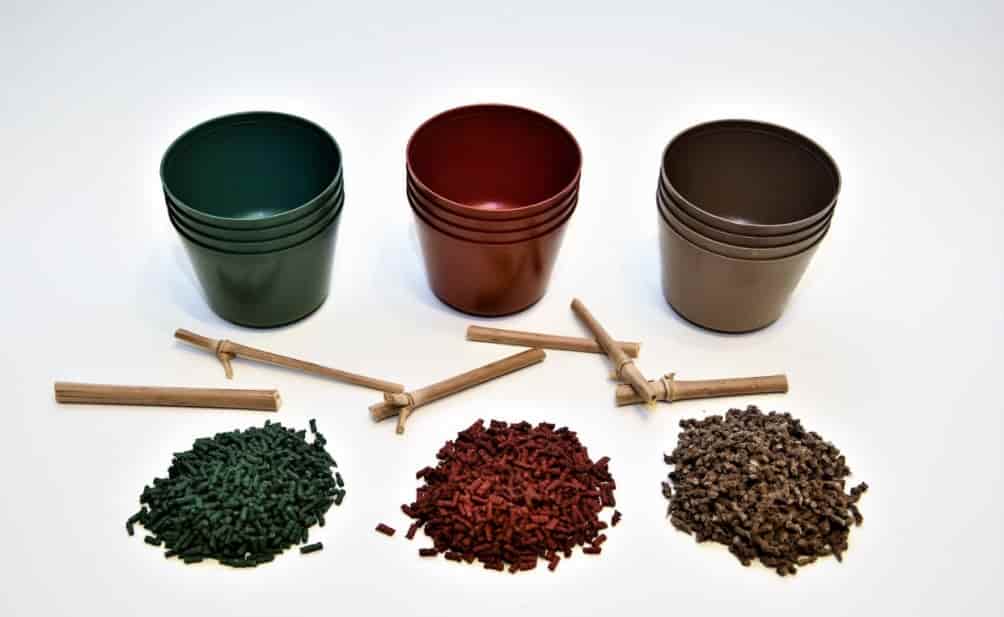
-creora 3D Max helps denim brands achieve circularity
Leading fibre producer will introduce new recyclable, recycled and bio-based denim solutions during Hyosung Denim Days. NonWoven Recycling TiO2 BioPET
Denim is increasingly being held to environmentally friendly standards as consumers put pressure on brands and retailers to reduce jeans’ ecological footprint.
In response, Hyosung has developed a number of sustainable denim solutions, which the company looks forward to presenting to industry during its personalized Denim Days event taking place in New York City, Los Angeles and London on select dates in November 2021.
creora 3D Max spandex – for recyclable jeans
Circularity is top of mind and denim brands and mills are following Ellen MacArthur Foundation’s Jeans Redesign guidelines for recyclable denim. Jeans Redesign’s standards are meant to create jeans that are both more durable and easier to separate and recycle.

-Infinited Fiber at INDEX™ 20: Infinna™ set to reshape the future of nonwovens
The nonwovens industry is ready for a more sustainable future: one that’s not reliant on virgin resources, where microplastic emissions are eliminated, and where disposable single-use items are biodegradable. At Infinited Fiber Company we are on a mission to use our fiber regeneration innovation to make this future a reality with our Infinna™ fiber, which looks and feels soft and natural like cotton – and is currently created 100% out of textile waste. NonWoven Recycling TiO2 BioPET
That’s why we’re headed to INDEX™ 20 (Tuesday 19th – Friday 22nd October). We’ll be showcasing the potential of Infinna™ for the massive nonwovens industry as a regenerated material alternative to conventional fibers.
Made of cellulose, Infinna™ is a biodegradable fiber that contains no microplastics. Its unique creation process also gives it naturally occurring antimicrobial properties, and testing shows it doesn’t irritate or sensitize skin. When made with Infinna™, nonwovens start their journey from a great place: capturing the value of existing resources that would otherwise be landfilled or incinerated, and lessening the burden on the Earth’s precious virgin resources.
Infinna™ has already been widely endorsed by the fashion industry, and some nonwovens producers have already put it to the test with promising results.
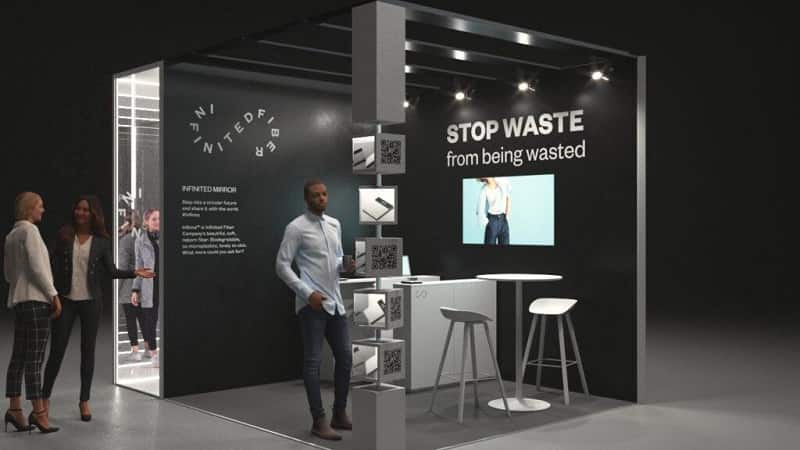
-What Lenzing’s new Tencel fiber offers denim
The Lenzing Group is expanding its sustainable offering for the denim industry with the introduction of matte Tencel branded lyocell fibers.
The new fiber type is specially designed to scatter light and permanently diminish sheen in denim applications, further enabling versatile, indigo-dyed denim fabrics.
“As a leader in fiber production, we work closely with our customers and mill partners to address their product needs,” said Tricia Carey, director of global business development for denim and the Americas for Lenzing AG. “Our partners wanted the option to choose denim fabrics that are less shiny and we listened. By implementing an innovative production process to create matte Tencel lyocell fibers, we are setting a new standard for indigo applications.” NonWoven Recycling TiO2 BioPET
By combining functionality with aesthetics, Carey said the introduction of matte Tencel lyocell fibers increases versatility in denim designs while reducing the ecological footprint of the resulting fabric and garment.
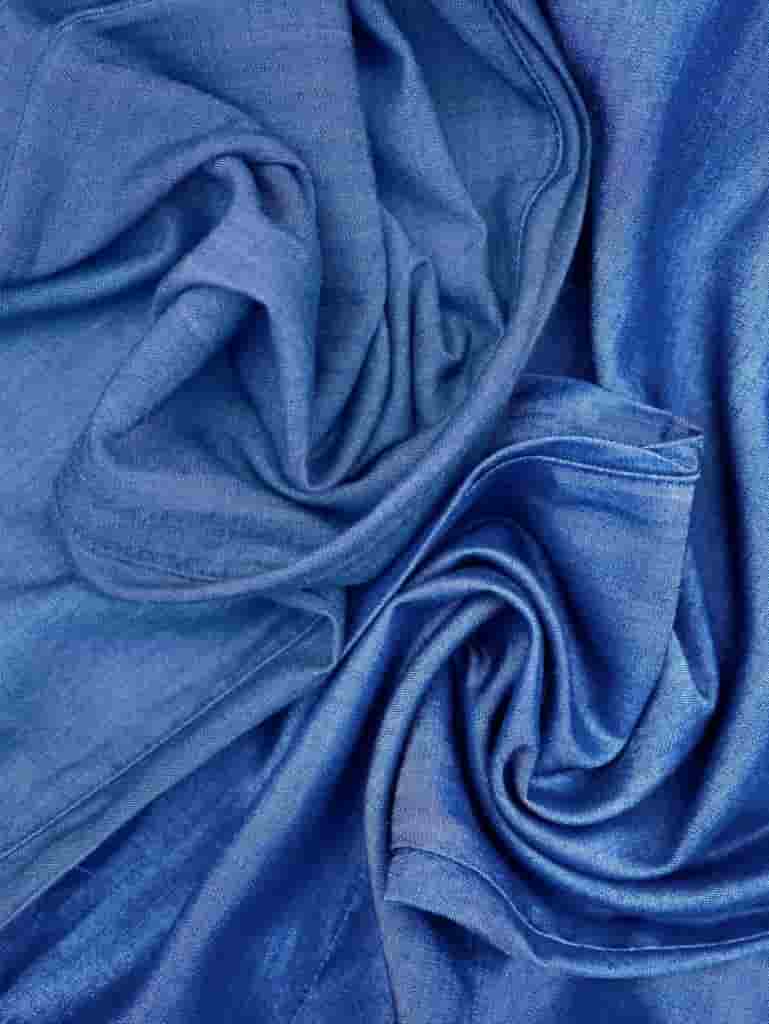
NonWoven Recycling TiO2 BioPET
